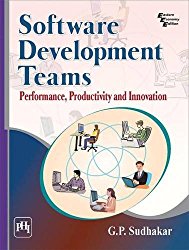9. Sudhakar, G.P. (2020), Project Management: The Managerial Aspects, New Century Publications, New Delhi, ISBN-10: 8177085158; ISBN-13: 978-8177085150.
The Book Project Management: The Managerial Aspects is a compendium of already published papers/articles related to Strategy and Project Management, Project Management Research and The People Aspects in Project Management. The book consists of 3 blocks. Block-I of the book Strategy and Project Management covers topics such as From Strategy to Program Management, Effective Project Management for Project Success, Ensuring Success for Global Manager with Required Skills, Role of Conflicts in Top Management Teams, and a Case Study on Tata group. Block-II Project Management Research explains the current research in project management with Understanding the Meaning of Project Success, A model of Critical Success Factors (CSFs) for Software Projects, Conflict Resolution in Projects, Critical Success Factors of Offshore Software Development Projects. One more unique topic in this block is Project Management Insights from Bhagavad Gita, an Indian centuries old epic; the topic related the Bhagavad Gita to Project Management Context. Block-III People Aspects in Project Management deals with People Aspects in Modern Project Management, Soft Factors Effecting Software Teams, Managing Dynamics in Teams, Managerial Aspects in Teams covering Teamwork in Software Organizations, Teamwork for Productivity, and Impact of Technology on Human Resources Function are explained in the book.
8. Sudhakar, G.P. (2020), Management Research FAQ: A Century of Questions, Amazon Publishing, ASIN: B08CS589JF.
The book Management Research FAQ: A Century of Questions defines different types of research, provides different management conceptual models, Illustrates different management research problems, and provides theoretical foundation for research by taking sample concepts from Strategic Management, Human Resources Management and Psychology, Innovation, Technology Management, Economics, Entrepreneurship, and Project Management. It also explains simple statistical techniques for hypotheses providing with easy to understand examples. The book comprises 100 different questions on management research. Provides example research problems, models, and variables from different management streams.
7. Sudhakar, G.P. (2017), Indian Management from Bhagavad Gita, Hyderabad, ISBN: 978-93-5291-823-2
The Bhagavad Gita teaches us dhyana yoga, karma yoga, bhakti yoga and gyana yoga. There are many lessons for management graduates and professionals to learn from Bhagavad Gita, They are leaderships, ethical management, strategy, individual behavior, organizational culture, project management, moral values, decision making and managerial effectiveness and efficiency. Many MNCs including organizations in the west are looking towards Bhagavad Gita for stress management, leadership building, teamwork, confidence building, uncertainty management and work life balance of their employees. This book can be useful for MBA/management students in Ethical Management, Work-Life Balance, and Personal Effectiveness courses. It can also be used as reference book to management professionals in industries. (PDF Download)
6. Sudhakar, G.P. (2016), Software Development Teams: Performance, Productivity and Innovation, Prentice-Hall (India) Learning Ltd., New Delhi, ISBN Number: 9788120351790.
The book, Software Development Teams, offers a new and unique approach to developing software project teams. It guides IT experts and managers for forming, assessing and developing successful project management teams for effective performance and productivity. Focusing on the management side of the software industry, this text-cum-reference book discusses key aspects of the management such as performance measurement, organisational structure and development, motivation of the team with awards and rewards to bring innovative ideas, and the best practices followed in the modern software industry for measuring the team effectively. The book begins with an introduction of software teams, explaining how software projects are different. It then discusses the characteristics, skills and competencies that are required for a perfect programmer or a project manager, in addition to many other dimensions of software development teams. It further includes empirical studies on team climate, team performance, team productivity and team innovation. Next, it explores the factors that are important for maintaining the software development team climate, and the impact of conflicts on teams, which may ultimately have negative impact on the organisation. Tools and techniques to measure performance of software development team are explained along with the factors that influence the teams’ performance, relationship between team cohesion, productivity and finally the performance. Different types of possible innovation in software teams and organisations, innovation cycle and framework, role of top management and leadership in team management are also given due weightage.
5. G.P.Sudhakar (2012), Global Organizational Behavior, Lap Lambert Academic Publishing, Germany, ISBN-13: 978-3-659-28930-9; ISBN-10: 3659289302
This book explains broadly three areas. Section-I deals with individual behavior in global organizations and impact of global organizations on individuals. Section–II deals with team behavior in global organizations. Section-III deals with organizational level structures, procedures and environmental aspects of global organizations. The book discusses the impact of global organizations on individual behavior, ethical, normal, abnormal behaviors, his or her safety and health management in global organizations. It also explains many team aspects such as global teams, decision making in global teams, communication in global teams, leadership in global teams, global team climate, global team productivity, global team performance and global team innovation. It also explains the organizational aspects such as impact of global organizational structures on individuals and teams; global organizational climate, global organizational culture, power, politics in global organizations and its impact on individuals and teams and the global organizational environment and its impact. Overall this book gives global exposure to management students, HR executives, managers and professionals.
4. G.P.Sudhakar, Project Management FAQ, Galgotia Publications Pvt. Ltd., New Delhi, 2012, ISBN Number: 978-81-7515-656-2
This book consists of all those FAQ and important questions useful for people preparing for interviews and also for those preparing for undergraduate and post graduate Project management examinations. This is the contribution towards the project management ready reference.
This book consists of 11 chapters. These 11 chapters are written by keeping PMI-PMBOK’s (Project Management Body of Knowledge) nine knowledge areas such as Project Scope Management, Project Time Management, Project Cost Management, Project Quality Management, Project Human Resources Management, Project Communications Management, Project Risk Management, Project Procurements Management and Project Integration Management in mind.
Over all this is a ready reference on project management for those preparing for job interviews and written examinations. I will be very happy if you get through the interview after going through this book.
3. G.P.Sudhakar, Elements of Software Project Management, Prentice-Hall (India) Learning Ltd., New Delhi, 2010, ISBN Number: 9788120341616
Project management requires immense skills to achieve the end-result. But sometimes lack of project management skills results in failures. It is therefore, essential to study the basic features of project management. This book is a contribution towards that goal. This book is divided into three sections—introduction, people-related aspects or human resources and advanced topics—the book brings forth the inside-story of the software project management in an IT company. The simple descriptive style of presentation will enable any beginner to get a clear picture of the procedures that are followed in the IT companies.
Intended for undergraduate and postgraduate students of computer science and engineering, this textbook will also be useful for many software engineers and professionals dominating the hierarchy of the IT industry. The Key Features of this book include review Questions to grasp the topics easily, Quiz Questions to reinforce the understanding of the subject and Relevant Case Studies depicting various situations and the necessary actions and decisions to be taken.
2. G.P.Sudhakar, Project Management: Training Manual, Akansha Publishing House, New Delhi, 2010, ISBN Number: 978-81-8370-219-8
Research indicates that majority of the projects fail not because of the technical issues but because of human issues. Hence, there is a need for researching and concentrating on human aspects of project management. This is the theme of this book. This book discusses the team development stages, how an individual behaves in a team, the needed skills for project manager, communication process in project teams, recruit a team member, acquire competent team members, train and manage team members, motivate the team members and manage stakeholders.
The powers of a project manager, techniques for conflict resolution, different team member’s behavioral patterns, stages in decision making and the decision making steps are discussed in this book. The ethics the project managers should follow when dealing with people are explained. Over all this is a good book for those who would like to master the people side of project management. Based on authors work experience in America, Europe and Asia and his work experience with much diversified multi-cultural teams, he has written this book.
1. G.P.Sudhakar, Business Essentials for Software Professionals, Excel Books, New Delhi, 2008, ISBN Number: 8174466371, EAN: 9788174466372, ASIN: 8174466371
Now-a-days IT career is becoming more and more global in nature. There are more than a million software engineers working in the Indian IT industry who are among the high fliers these days, travelling across continents. In recent times, it has been felt that to have a successful global IT career, the skills acquired in engineering colleges are not sufficient. There are certain other skills which are essential for the software engineers to achieve success globally. This book is all about those skills. The book talks about IT management skills such as project management, program management, IT strategy, and quality management. It also covers the soft skills required for software engineers such as communication skills, presentation skills, leadership skills and listening skills. It distinguishes between a leader and a manager. The book explains the business and management concepts, which the software professionals need to be aware of, such as, basic management functions, strategic management, marketing management, new product development, knowledge management and human resource management. Also some other topics, such as, how to get into reputed business schools and what are the career alternatives for software engineers, are also dealt with in an elaborate manner.









